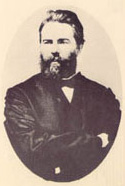August 1: Herman Melville
Herman Melville (1819)
It was on this date, August 1, 1819, that the American novelist Herman Melville was born in New York, into a family of the Dutch Reformed church, the third of eight children. At age 7, scarlet fever left Melville somewhat visually impaired, and although his father died when he was 12, he was able to educate himself and find work as a clerk, a teacher, and a farmhand.
It was as the 20-year-old Melville served as a cabin boy on a South Seas whaling ship, and later in the Navy, that he found his subject. He lived briefly among the Typee cannibals in the Marquesas Islands and spent time among the natives of Tahiti. He began writing and, in 1846, published his most popular novel, Typee. He followed that with the similarly successful sequel, Omoo, about his experiences in the Polynesian Islands.
Melville married in 1847 and later bought a farm near Nathaniel Hawthorne's home at Pittsfield, Massachusetts. The authors became longtime friends and corresponded frequently. It was Hawthorne who suggested to Melville that he change his whaling book into the allegorical novel Moby Dick. It was a popular failure, but 30 years after the author's death it began to be recognized as Melville's masterpiece.
Melville offered a sample of the novel to contemporary author Nathaniel Hawthorne:
Shall I send you a fin of the Whale by way of a specimen mouthful? The tail is not yet cooked — though the hell-fire in which the whole book is broiled might not unreasonably have cooked it all ere this. This is the book's motto (the secret one), – Ego non baptiso te in nomine – but make out the rest yourself.*
The Latin expression is a burlesque on the Christian baptismal formula, Ego non baptiso te in nomine patris, sed nomini diaboli; that is, "I baptize you not in the name of the Father but in the name of the devil."
While sailing in the South Seas, Melville had acquired a thorough distaste for Christianity. There, as writer Gary Sloan characterizes it, he witnessed not the faith, hope and charity he had been taught to expect, but
militaristic nationalism, ethnocentrism, slavery, hypocrisy and predatory capitalism. ... He whiffed the foul contagion of colonialism. In the Marquesas Islands, "The small remnant of natives had been civilized into draught horses and evangelized into beasts of burden." On one island, Christian sailors frenziedly sated their lusts on naïve Polynesian maidens. On another, French gunners tested their cannons on natives assembled to greet them.**
The great white whale in Moby Dick is, of course, Ahab's image of a vengeful God. Ahab was no Atheist, and neither was Melville, who has the novel's Presbyterian narrator, Ishmael, refer to his captain as a lunatic, thus evading a charge of blasphemy. To Ahab (as to Melville), God was a fiend:
All that most maddens and torments; all that stirs up the less of things; all truth with malice in it; all that cracks the sinews and cakes the brain; all the subtle demonisms of life and thought; all evil, to crazy Ahab, were visibly personified, and made practically assailable in Moby Dick. He piled upon the whale's white hump the sum of all the general rage and hate felt by his whole race from Adam down; and then, as if chest had been a mortar, he burst his hot heart's shell upon it.†
Called on his impiety by the Pequod's pious first mate, Starbuck, Ahab replies, "Talk not to me of blasphemy, man. I'd strike the sun if it insulted me." Of course, Ahab could never battle God and win. His creator, Herman Melville, died at home, of a heart attack, shortly after midnight on 28 September 1891, age 72. Of Melville, his friend Hawthorne once said, "He can neither believe, nor be comfortable in his unbelief; and he is too honest and courageous not to try to do one or the other. If he were a religious man, he would be one of the most truly religious and reverential; he has a very high and noble nature, and better worth immortality than most of us."‡
* Letter: Melville to Nathaniel Hawthorne, 29 June 1851.
** Gary Sloan (2001), reprinted as "Moby Dick: Broiled in Hellfire," Free Inquiry (22:3), Summer 2002, pp. 62-63.
† Moby Dick, or the Whale, 1851 (You will find Captain Picard repeating the last sentence of this quote in the 1996 Star Trek film Star Trek: First Contact).
‡ Journal of Nathaniel Hawthorne, 12 November 1856.
Originally published August 2003 by Ronald Bruce Meyer.


